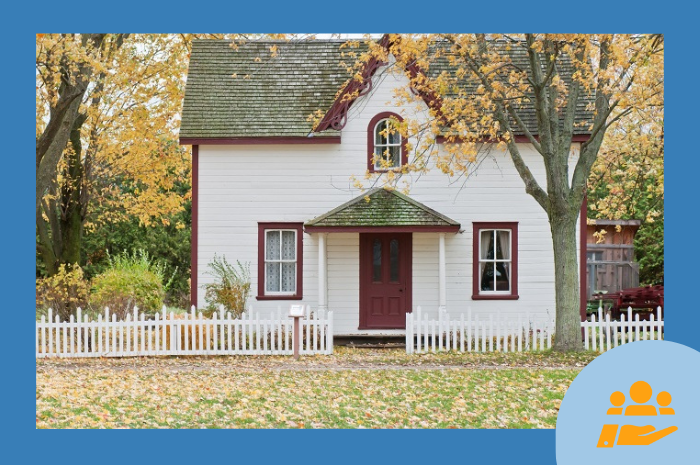
A practical guide to understanding your mortgage
At XpertSource.com, we know that it can be complicated to understand all the issues and terminology related to mortgages. Mortgage loan, closed, open, fixed, or variable rate mortgage, collateral mortgage, mortgage loan insurance, etc. It’s not easy to navigate all these elements, especially if this is your first real estate purchase!
That is why we decided to create this guide, which is both simple and comprehensive. As you read, you will find a lot of essential information for the smooth purchase of your mortgage loan (or renewal).
For those who need to acquire a new mortgage, we have dissected all the essential elements for you to know before and while shopping for your mortgage to be able to find the package that suits you best.
If you want to renegotiate the mortgage you have previously contracted, you can head directly to the Renegotiate your loan section on page 19. You will find all the information you need to go ahead with your mortgage renegotiation.
The XpertSource.com platform was set up to support buyers and owners of real estate. It brings together a large network of professionals: real estate brokers, mortgage brokers, chartered appraisers, building inspectors, notaries, etc. When you submit your project to XpertSource.com, you are sure to be put in touch with qualified experts who will be able to guide you through each step of your project.
Access the PDF version of this article.

The role of the mortgage broker
Many people mistakenly believe that doing business with a mortgage broker is no better than shopping for a mortgage on your own. However, you should know that this type of expert can offer you valuable help and advice when choosing your mortgage.
Unlike a mortgage advisor, who only works with one bank, the mortgage broker acts as an intermediary between you and various lenders (financial institutions or private lenders). Their goal is simple: finding the best financing solution for your real estate project.
A mortgage broker will take the time to analyze your financial situation and look through the mortgage products of different financial institutions to be able to find the one that is right for you.
Did you know that using a mortgage broker won’t cost you a dime? Indeed, this service is completely free!
The mortgage broker is paid, in the form of a commission, by financial institutions when they find a new client. Their salary depends directly on their level of productivity and the effort they put into their work. And since the compensation is remarkably similar from one financial institution to another, you can rest assured that the mortgage broker is working only in your best interests.
Doing business with a mortgage broker offers many advantages :
- They explain the mortgage system to you;
- They help you save time (and money!);
- They protect your credit report;
- They negotiate for you;
- They take care of administrative tasks;
- They direct you to the best financial institution based on your financial profile.
Discover What is the role of a mortgage broker?
The purchase: what you need to know
The documents you need
Obviously, several documents are necessary for your mortgage broker to be able to prepare your file. While they will give you a detailed list of what you need, there are some documents you can prepare ahead of time to speed up the process of obtaining your mortgage.
The required documents may vary depending on your situation. If you qualify for a first application or if you renew, as well as if you are an employee or self-employed worker, the documents required will not be the same.
Here is a non-exhaustive list of documents that may be required for your mortgage application:
- Employee: notice of assessment from the governments (federal and provincial) for the last 2 years, T4, last pay statement, letter of employment.
- Self-employed worker: tax assessment from both levels of government (federal and provincial) for the last 2 years, latest tax report including appendices on the statement of income and expenditure, company financial report.
- Purchase in progress: promise to purchase and its annexes, description of the property, municipal and school tax invoice, document supporting the source of your down payment (bank account statement, donation letter, etc.), certificate of conformity of the well and the septic tank (if applicable).
- Construction or self-construction: offer to purchase the land, plan and specifications, copy of the building permit.
- Renewal: property tax account, copy of the current mortgage deed, recent mortgage statement.

Your credit report
Having a good credit history is essential when looking to get a mortgage. The better your credit score, the more leeway you will have in negotiating the terms of your loan with your financial institution.
Your credit report contains several pieces of information relating to your financial situation. It is, among other things, a portrait of your debt level and your repayment habits.
In Canada, Equifax and TransUnion are the two companies responsible for managing credit reports. They are constantly receiving data from your creditors to assign you a score identifying you as a good or a bad payer. This score varies between 300 and 900 points:
- Between 900 and 775 = Very good
- Between 774 and 650 = Good
- Between 649 and 525 = Medium
- Between 524 and 400 = Mediocre
- Between 400 and 300 = Very poor
It can be hard for an individual to obtain a mortgage when they have a score of 524 or less. And even if they are successful, the interest rate may be extremely high compared to the average mortgage, to offset the risk assumed by the lender.
In addition to this score, a rating is given to assess the way you manage your credit. Often made up of the letter R followed by a number between 1 and 9, this rating indicates whether you are paying your bills on time. The best (R1) means you make your payments on time, within 30 days, while the worst (R9) is usually associated with bankruptcy.
Before you start the process of obtaining a mortgage, make sure you have a good financial history. Pay off various debts that could negatively affect your credit and avoid taking on more (now is not the right time to buy the new car of the year).
Mortgage loans and bankruptcy
Have you declared bankruptcy in the past? Although this will remain on your credit report for 6 to 7 years, it is still possible to get a mortgage if you meet certain conditions:
1. You must absolutely have rebuilt your credit report since filing for bankruptcy.
2. You can apply for a loan two years after being discharged from your bankruptcy (so two years after repaying your debt).
3. The financial institution to which you are applying for a loan must not have been affected by your bankruptcy.
4. Ideally, you should have earned your down payment through personal savings. A down payment greater than 5% may be required by the lender.
A financial institution could still decide not to give you a loan, even if you meet all these conditions.
What can you do to straighten out your credit report?
Improving your credit does not happen overnight. This is a process that can take several years and requires a lot of rigour.
- Contact your creditors, explain the situation to them and make a realistic payment arrangement.
- Give up some of your credit cards if you have more than one. Try to keep the oldest ones to preserve your credit history.
- Pay your bills before the deadline.
- Pay at least the minimum amount on your credit cards every month. If you can, try paying a little bit more.
- Vary your types of credits. A combination of several types of credit, when effectively managed, is generally viewed favourably by creditors.
- Avoid using more than 35% of your available credit.
- Limit the number of credit requests and inquiries. If there are too many requests, some lenders may think you are in dire need of credit or are trying to live beyond your means.
Be aware that all your assets, savings and RRSPs are not counted in your credit report. They may, however, allow you to improve your borrowing terms.

The down payment
In Quebec, a down payment is essential to obtain a mortgage loan. You cannot get a mortgage without a minimum down payment.
The down payment is equivalent to a minimum of 5% of the purchase cost of the property but varies according to the value of the house. When this exceeds the $ 500,000 bracket, the required down payment increases to 10%. If the property costs $ 1 million or more, you need to accumulate a 20% down payment.
There are several options available to raise the funds necessary to obtain your mortgage. You can also use a traditional or non-traditional down payment to finance your purchase.
Traditional down payments
- Personal savings (the amount must be inscribed in the bank account for a minimum of 90 days);
- Withdrawal from an RRSP (HBP program);
- Inheritance ;
- Amount from the sale of a property;
- Non-refundable donation from a close relative.
Non-traditional down payments
- Personal bank loan;
- Credit card ;
- Personal line of credit;
- Repayable loan from a friend or relative.
If you decide to use any of these non-traditional down payments, be aware that they can negatively affect your debt ratios. This could make it harder for you to get your mortgage and, in some cases, prevent you from making your purchase plan a reality.
Good to know: there are many homeownership programs offered by the federal and provincial governments, as well as some larger cities (Montreal, Quebec, Sherbrooke, etc.). Some of these programs, in the form of an interest-free loan, can help you increase your down payment.
The table below shows how the minimum down payment is calculated based on the purchase price of the property:
|
Purchase price for the home |
Minimum % for down payment |
Down payment amount |
|
$350 000 |
5 % |
$350 000 x 5 % = $17 500 |
|
$500 000 |
5 % |
$500 000 x 5 % = $25 000 |
|
$650 000 |
5% on the first $ 500,000 10% on the rest |
$500 000 x 5 % = $25 000 $150 000 x 10 % = $15 000 $25 000 + 15 000 = $40 000 |
|
$1 000 000 |
20 % |
$1 000 000 x 20 % = $200 000 |
It is possible to offer a down payment greater than the minimum percentage. You could very well provide a 20% down payment on a house of $ 350,000. The larger your down payment, the smaller your mortgage will be. This can save you thousands of dollars in interest!
Also, note that a 5% down payment is not enough to cover all the expenses related to the purchase of a property. Most banks require you to have approximately 1.5% more cash in your possession to be able to pay the closing costs. Therefore, you should plan for a minimum budget of 6.5%.
Either way, if your down payment is less than 20% of the purchase price, the lender will claim mortgage default insurance.

Mortgage loan insurance
If the amount of your loan is more than 80% of the purchase price of the property, you will need to purchase mortgage loan insurance. In certain situations (if you are self-employed, for example), you may need to get this insurance even with a down payment of more than 20%.
Mortgage default insurance doesn't protect you. Rather, it protects your lender in the event of a payment default on your part.
How much does mortgage default insurance cost?
To get insurance, you will need to pay a fee called a "premium." Mortgage insurance premiums vary between 0.60% and 4% of your mortgage amount and will be calculated based on your down payment. The higher your down payment, the less expensive your insurance premium.
| Ratio of the loan to the value of the house | Premium applying to the loan amount |
| 65 % or less | 0,60 % |
| 75 % or less | 1,70 % |
| 80 % or less | 2,40 % |
| 85 % or less | 2,80 % |
| 90 % or less | 3,10 % |
| 95 % or less | 4 % |
How to pay your premium
You can pay your insurance premium in two ways: you can either pay a lump sum or add it to your mortgage. Note, however, that you will pay interest on the premium if you decide to add it to your loan.
Good to know: when obtaining a mortgage, some banking institutions offer their clients the option of purchasing a mortgage life insurance covering the balance of the mortgage. This coverage protects your loved ones in the event of death or disability.
Unlike mortgage loan insurance, life insurance is optional, and you don't have to accept the one offered by your lender. If you are interested in this protection, do not hesitate to compare several insurance policies before making your choice.
Associated costs
Most first-time homebuyers tend to underestimate all the fees associated with the real estate transaction. It is not enough to provide an amount for the down payment: many other expenses must be considered in your budget. It is important to have about 1.5% more cash to pay for all the associated costs and to ensure a good purchasing experience.
As we mentioned in the previous section, there are additional charges if your down payment is less than 20% and you need to purchase mortgage loan insurance.
You will also have to pay for other fees related to your mortgage and to the purchase of your home, such as:
- Notary fees ;
- Evaluation fees;
- Credit file study fees;
- Administrative costs ;
- Pre-purchase inspection;
- Moving in;
- GST and QST (only for new houses);
- Property transfer taxes, alias the welcome tax;
- Municipal and school taxes;
- Potential renovations;
- Etc.

Mortgage pre-approval
Mortgage pre-authorization consists of defining which financial institutions would be ready to support you in your real estate purchase project. It also allows you to know the amount of the mortgage that could be granted to you. In doing so, you will be aware of the maximum amount that you can invest in your future home.
Getting a mortgage pre-approval in 5 steps
1. Decide whether you will do the legwork yourself or with the help of a mortgage broker. Be aware, however, that taking the steps yourself can negatively affect your credit report. Therefore, our best advice is to work with a mortgage broker.
2. Fill out the application form (from your broker or financial institution). You will need to provide several pieces of information relating to your identity, your credit rating, your financial situation, and your down payment.
3. Calculate your debt ratio and repayment capacity with the Gross Debt Amortization (ABD) and Total Debt Amortization (ATD) reports.
4. Confirm your borrowing capacity with your broker or financial institution and submit your request.
5. Get a mortgage pre-authorization. Note, however, that even if your request is accepted, this does not mean that your file is definitively accepted. It is also possible that your mortgage pre-approval request will be refused.
Discover How to get pre-approved for a mortgage?
ABD and ATD debt ratios
These are essential elements of mortgage pre-approval. They allow you to assess your ability to repay a loan. Two ratios are used by financial institutions for their analysis: ABD and ATD.
ABD = (Principal + interest + taxes + heating) / Gross income
ATD = (Capital + interest + taxes + heating + other debts) / Gross income
An ABD ratio of 32% and an ATD ratio of 40% are usually the maximum percentages sought by financial institutions.

Choosing your mortgage: what to consider
The types of mortgages
One of the decisions you will need to make when shopping for your mortgage will be what type of mortgage is best for you. Will you go for an open or closed mortgage? Subsidiary (also called an “umbrella”) or conventional?
Closed mortgage
This involves paying a fixed amount for the entire duration of the mortgage term. Making a prepayment is difficult, and financial penalties may apply if you increase your payments. The interest rate for this mortgage is lower but is spread out over a longer period.
Open mortgage
This type of mortgage allows you to make early repayments without incurring additional costs. It is ideal for those planning a short-term cash flow, as its contract is short-term (6 months or 1 year). The interest rate is often higher than that of a closed mortgage.
Conventional mortgage
With this type of mortgage, the amount recorded will be equal to the amount of your mortgage. If you need more money to finance your projects (renovations, for example), you will need to apply and qualify for another mortgage.
Subsidiary mortgage (umbrella)
The amount associated with this mortgage is greater than the amount of the mortgage. This gives you additional funds to finance your projects or secure other debts besides your mortgage, without having to refinance the mortgage.
Variable or fixed-rate mortgage
When choosing your mortgage, you will also need to consider whether you prefer a fixed rate or a variable rate mortgage. While the financial impacts of this decision will not be immediately felt, it will be of major importance for years to come.
Fixed-rate
As the name suggests, a fixed rate ensures that you pay equal payments for the duration of the mortgage term. It will not be affected by market fluctuations, that is, the interest rate will not increase, but you also won’t be able to benefit from a potential decrease in the interest rate.
The fixed-rate can sometimes be higher than a variable rate, but its stability and predictability make it the best option for simplifying your long-term financial planning.
Variable rate
The variable rate leads to a certain degree of uncertainty since it can be affected upward or downward by market fluctuations.
Contrary to what one might think, the variable rate does not necessarily cause fluctuation in monthly repayments. These will remain the same from month to month. Rather, it is the proportion of repayment devoted to principal (capital) and that devoted to interest that will change according to market variations.
Term and amortization
These are two other expressions you will come across while shopping for your mortgage. It is therefore important to know exactly what they mean to understand what your mortgage involves.
Amortization period
It represents the total number of years you have to pay off your loan. While a longer amortization period will reduce your payout amount, it also means you will pay more interest.
The usual amortization period in Quebec is 25 years, which is the maximum allowed period. However, you can get a shorter amortization period, for example, 15 or 20 years.
Mortgage term
The term is the length of time your mortgage remains at the agreed interest rate. The term can be between 6 months and 10 years, during which time you agree to make a specific repayment. The most common term is that of 5 years.
Once this period is over, you need to renegotiate the terms of your loan. Most homeowners must renew their mortgage term 4 to 5 times before paying off their debt.
For example, you can choose a mortgage that is amortized over 25 years with a term that is renewable every 5 years. To fully repay your loan, you will then have to renew your term 5 times.

Frequency of payments
Determining how often you will make your mortgage payments can have a huge impact on the interest you accumulate over the years. Here are the possible frequency of payments:
- Monthly mortgage payment: an amount is withdrawn on the same date each month, for a total of 12 payments per year.
- Bi-Weekly Mortgage Payment: An amount is withdrawn every 2 weeks, for a total of 26 payments per year. This frequency is one of the most popular, especially because it coincides with the pay period for many people. To calculate bi-weekly payments, the monthly amount is multiplied by 12, then divided by 26.
- Accelerated Bi-Weekly Mortgage Payment: Like the Bi-Weekly Payment, but more payable. To calculate it, the monthly amount is divided by half.
- Weekly Mortgage Payment: An amount is taken each week for a total of 52 payments per year. To calculate the amount, the monthly payment is multiplied by 12, then divided by 52.
- Accelerated Weekly Mortgage Payment: Like the weekly payment, but more payable. To calculate it, the monthly amount is divided by 4.
The mortgage loan deed
The mortgage deed (or mortgage loan agreement) is an essential document in obtaining your loan. It contains all the details of the loan terms to authenticate and validate the mortgage you have signed with your financial institution. There are two different types of mortgage deeds: the mortgage deed and the mortgage guarantee deed.
The mortgage deed
This is the classic and best-known document. However, it is decreasing in popularity.
It contains all the terms of the loan, including:
- The capital ;
- The interest rate ;
- The term ;
- The amortization period;
- The amount and frequency of payments.
In general, it is easily transferable from one financial institution to another. When the debt is repaid, the mortgage deed ends with the signing of a discharge deed.
The mortgage guarantee deed
Also known as the "universal deed" and "collateral mortgage deed", it includes a series of obligations to provide additional protection to the lender. The act also makes it possible to guarantee other current or future debts, such as:
- A car loan;
- A personal loan;
- A line of credit;
- Etc.
This type of deed is more difficult to transfer between lenders.

Renegotiating your loan: what you can do
Mortgage renewal
Your mortgage is coming to an end soon. You have two main choices: renew your mortgage or pay it off. Depending on the length of your term, you may need to renew your mortgage several times before paying off your entire loan.
Your lender must give you a renewal notice at least 21 days before your term is due. This notice must contain the following information:
- The remaining balance to be repaid on the date of renewal;
- The prevailing interest rate;
- The frequency of payments;
- The length of the term;
- Applicable fees.
When the time comes to renew your mortgage, be sure to reassess your needs. Ask yourself the following questions to find out if the terms of your mortgage are still right for you:
- Has your financial situation improved or deteriorated over the past few years?
- Does your budget allow you to pay off your loan faster?
- Is the frequency of your payments still appropriate for your situation?
- Are you satisfied with the services of your current lender or should you change financial institutions? What will be the possible consequences in the event of a transfer?
- Do you need additional funds that might require refinancing?
- Does your mortgage allow you to renegotiate certain clauses before the end of your term?
Do not hesitate to negotiate the terms of your renewal directly with your lender or through a mortgage broker. Without your intervention, your mortgage could automatically renew for another term.
Good to know: four months before your loan is due, contact your mortgage broker. They will be able to renegotiate a mortgage that better suits your needs. They may also “freeze” the current mortgage rate for a period of 120 days, thus ensuring you the best available rate when you renew it.
Learn Everything your need to know about mortgage renewal.
Early renewal: a good idea?
Your financial institution has contacted you to offer to renew your mortgage early. While your current rate is 3.54%, the bank is offering you a new rate of 3.14% for the next 5 years. Should you accept?
While early renewal may sound interesting, it could prove to your disadvantage:
- The rate may continue to decline between the time of application and the actual date of your renewal. You will therefore have accepted a higher rate than necessary.
- The new proposed rate may also be higher than your current rate. By renewing prematurely, you will lose the benefit of your rate for a few months.
Take the time to think about it before accepting the offer from your financial institution. Don't hesitate to ask your mortgage broker for advice to help you make up your mind.

Mortgage refinancing
After several years, you may have accumulated various debts. To facilitate the repayment of these debts, you could decide to refinance your mortgage. You might also choose to refinance to help pay for other future life projects.
Mortgage refinancing involves renegotiating your loan based on the equity in your property. You can then choose new terms for your loan and take advantage of a better interest rate.
You can borrow a maximum of 80% of the appraised value of your property, minus the remaining balance on your mortgage. For example:
Estimated value of the house: $ 350,000
80% of appraised value: $ 280,000
Remaining mortgage balance: $ 165,000
Maximum amount of refinancing: 280,000 - 165,000 = $ 115,000
If you refinance your mortgage before the end of your term, you may have to pay prepayment and other administrative fees.
NOTE: refinancing your mortgage should be used to increase the value of your assets by decreasing the amount of your debts. It should not amplify your current debts. Talk to your mortgage broker to see if this is the right solution for you.
Mortgage transfer
When renewing the term of your mortgage, you may decide to transfer your current mortgage to another lender. The new financial institution will then need to approve your mortgage application and may require different criteria than your original lender.
The ability to transfer your mortgage can be more complex depending on the type of mortgage you have chosen. For example, a collateral mortgage may be more difficult to transfer because it covers more than the mortgage debt.
Fees associated with a mortgage transfer
If you decide to change lenders, make sure you know the costs associated with the transfer. For example:
- Transfer fees from your current lender;
- Application fees (receipt, registration, etc.);
- The cost of assessing the value of your property (if necessary);
- Other administrative costs.
You can then decide whether to go ahead (or not) with your transfer request with full knowledge of the facts.
Termination of the contract and early refund
Have interest rates gone down? Has your financial situation changed? Are you planning to move? Here are some reasons that could lead you to pay off your loan faster or cancel your mortgage completely.
Whether you decide to cancel your contract or make an early repayment, be aware that you may have to pay some rather expensive penalties. In some cases, these penalty fees can amount to several thousand dollars! The amount requested will depend on several factors, including:
- The number of months remaining before the end of your term;
- The prevailing interest rate;
- The method used by your lender to calculate the penalties.
Make sure you know the terms of your contract before going ahead with a termination request. You can ask your mortgage broker for more details or directly from your financial institution.
What is a prepayment lien?
In some cases, your lender may grant you a prepayment lien. This allows you to repay an additional amount, on top of your regular payments, without having to pay penalties. You can then:
- Increase your usual payment by a certain percentage;
- Make a lump-sum payment, equivalent to a certain amount or percentage of the mortgage.

Tips for becoming a mortgage pro
1. Watch out for dangerously low-interest rates. A much lower rate than those offered by most lenders is usually a trap.
2. Want to reduce your payments by taking a longer amortization period? While this might sound like a good idea, it also means you'll pay a lot more interest. Don't be afraid to increase your payment amounts a bit if your budget allows for it. Your wallet will thank you in the long run.
3. Don't skip the mortgage pre-approval stage. Not only does it let you know more about your buying power, but it also gives you greater bargaining power with sellers.
4. Don't wait until the last minute to plan your mortgage renewal. By starting a few months in advance, you will have more flexibility to renegotiate the terms to your advantage with your lender.
5. Take the time to fully assess your situation and speak fully with a mortgage broker. Only then can you be sure that you have the mortgage that is best suited to your needs.
6. Are you experiencing financial difficulties? Don't wait before contacting your broker or lender. It’s best to do it early to try to find a solution.
Are you looking for a mortgage expert?
XpertSource.com can help you in your efforts to find a mortgage broker. By telling us about your project, we will refer you to top-rated experts, free of charge! Simply fill out the form (it only takes 2 minutes) and you will be put in contact with the right experts.
Dial 1 833 203-7768 to speak with one of our customer service representatives
|
|
Related articles
Find the professional you need
Find your real estate professional by filling out the short form
Fill out this short form






